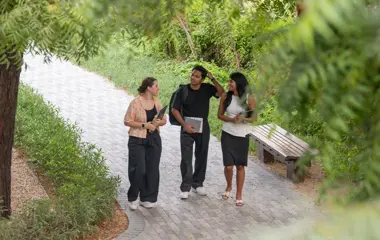Key information
- Funding
- Self-funded
- School
- Social Sciences
- Location
- Edinburgh
- Delivery type
- Full-time, Part-time
- Start date
- September
- Duration
- 3 years
A particular strength is our translation and interpreting research, which is based in the internationally recognised Centre for Translation and Interpreting Studies in Scotland (CTISS). The Centre provides a focus for research into the socio-professional use of language in multilingual environments. Its aims include investigation of the nature of the process of translating/interpreting and the construction of social communication, dissemination of research and the promotion of awareness of issues relating to the profession and to the training of interpreters and translators.
The CTISS brings together staff and postgraduate research in our core areas of translation studies, interdisciplinary social communication studies and discourse linguistics. A belief that understanding of textual strategies (genres, discourses, texts) is central to the discourse processes involved in translating and interpreting is a unifying theme of much of the work done in CTISS.
In addition to core research in translating and interpreting processes, the Centre also carries out research on contrastive textology and social communication science.
Programme duration
Normally 3 years.
Research projects
We welcome applications from suitably qualified prospective research students interested in pursuing PhD studies that fall under the broad range of expertise we have in translation and interpreting, including:
- Public Service Interpreting: Standardizing Quality and Professionalisation
- Police Interpreting
- Interpreting and Translating In Mental Health Settings
- Translation of Cultural Objects
- Evaluative or Persuasive Written Communication in Business Contexts
- Interpreter-mediated Interaction
- Migrant Memoirs and Literature in Translation
- Linguistic Needs and Policy in Multilingual Europe
- Legal Interpreting Provision, Training and Policy
- Translating/Adapting Music Across National Boundaries
- Sign language interpreting and translation
- Corpus methodologies in Translation and Interpreting Studies
- Multimodality and Translation
We actively promote interdisciplinary work across contexts, genres and modalities. The incorporation of sign language studies coordinates with the wider epistemological move towards multimodality and digital analytical platforms.
Entry requirements
Candidate criteria
We welcome applications from suitably qualified candidates. Please note that it is not necessary to have identified a potential supervisor before submitting your application.
Students successful in obtaining a place on our PhD programme normally commence their research studies at the start of the academic year in September. However, it is possible to join the PhD programme at an agreed date during the academic year.
Applications should be submitted via the Heriot-Watt online application portal.
N.B: In order that your application can be processed please ensure all of the supporting documents listed below are submitted with your application:
1. Academic Transcripts and Degree Certificates
Copies of full academic transcripts from all previous academic degree courses and copies of degree certificates for degrees already awarded.
If you are currently pursuing a degree course please provide all available marks to date.
2. Research Proposal
The research proposal should be around 5-8 pages long and contain as much as possible of the following: an introduction or outline of the proposed topic; a statement of objectives and/or specific research questions; a summary of some of the relevant literature which supports the research objective(s); an indication of the intended research methodology; an indication of the theoretical structure and/or conceptual outline; a provisional timetable of the major phases of the research process; results expected from the research e.g. practical value of the research or possible contributions to knowledge or policy or methodology. At this stage we are not looking for a definitive document but merely an indication that you have thought through most of the above issues.
Please note that work submitted may be subject to screening via plagiarism software.
3. English Language Requirements
See section on English Language Requirements below.
4. Funding Information
You should confirm how you are proposing to fund your studies.
5. References
If you have references available these should be submitted with your application. If they are not currently available please ensure that you provide the names and contact details, including email addresses, of two academic referees on the application form. You may also submit a Curriculum Vitae if you wish.
English language requirements
If you have not already studied a degree programme that was taught and examined in the medium of English we require evidence of language proficiency:
For IELTS: the minimum overall IELTS score is 6.5 with no score lower than 6.0 in Reading, Writing, speaking and Listening.
Further information can be found at https://www.gov.uk/tier-4-general-visa/knowledge-of-english
English language requirements
If your first language is not English, we'll need to see evidence of your English language ability.
The minimum English language requirement for entry to this programme is IELTS 6.5 (or equivalent) with no score lower than 6.0.
If you do not have IELTS 6.5, we offer a range of English language courses to help you meet the English language requirement for this programme prior to commencing your studies.
For more information about your application and our English Language requirements, please see Section 10 of our page on English Language Requirements as part of your application.
Funding information
| Status | Full Time | Part Time |
|---|---|---|
| Scotland | £5,151 | £2,575.50 |
| England / Wales / N Ireland | £5,151 | £2,575.50 |
| International | £20,456 | £10,228 |
- Status: Your residency status is usually defined as the country where you have been ordinarily resident for the three years before the start of your course.
- International: 'International' includes applicants from European Union countries who do not hold Pre-Settled or Settled status in UK. (This does not include students from the Republic of Ireland - see above).
We offer a number of competitive funded scholarships for research degrees. Full or partial support may be available for well-qualified candidates from UK research councils, research pools, charities or industry.
View our full range of scholarships.
Why Heriot-Watt
We're the top university in Scotland for graduate outcomes which means that more of our graduates are employed or in postgraduate education than any other institution in the country and we ranked 5th in the UK.
We're also rated number one in the UK for CEO or MD roles, meaning more of our graduates go on to become CEOs or MDs than any other university in the whole of the UK. On top of that, we have beautiful campuses, across the globe, so you'll get a truly international education. Our Edinburgh Campus is home to Oriam, Scotland's National Sports Performance Centre combined with plenty of wellbeing resources, prioritising fitness and mental health for all students. Our Global Research Institutes look at solving real world issues such as climate change and saving our oceans as well as working on the next medical technological breakthrough and the future of AI and robots.


